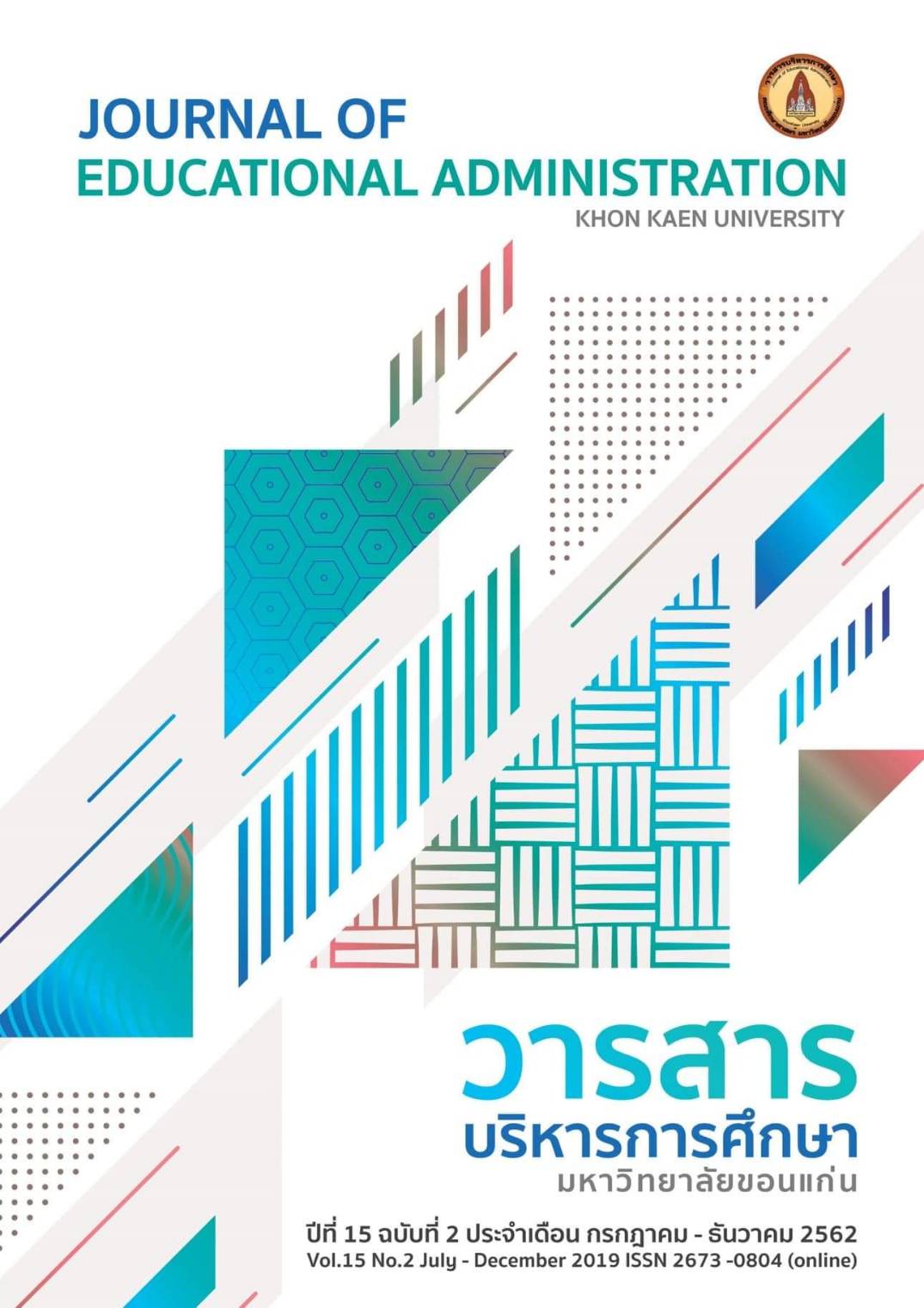LEADERSHIP OF BASIC EDUCATION SCHOOL ADMINISTRATORS AFFECTING CREATIVE SCHOOL MANAGEMENT
Main Article Content
Abstract
The administrators of basic education institutions are appointed by law to act as commanders. Supervised in the school. Administrators must have the ability to persuade the minds of teachers and other personnel to cooperate and work together. Executives must have leadership, especially in the digital technology era and must have creative competencies because they are important components. As an indicator of success, so that all colleagues can use their abilities effectively. Therefore, all basic education institutions Therefore, executives need creative leadership that will help the school to progress and which will directly affect the quality of education of the nation in the educational reform era, subordinates are involved in every step, from planning Defining objectives Operations and Evaluation. Which will create satisfaction for all stakeholder both teachers, learners, parents and the community Effectively From the creativity of the executives systematically Will be an important force in creating people Build society and create nation to continue to prosper.
Article Details
References
กระทรวงศึกษาธิการ. (2562). การประกันคุณภาพการศึกษา พ.ศ. 2561. กรุงเทพมหานคร: ราชกิจจานุเบกษา.
ธรรมศาสตร์ เยาว์ธานี. (2560). การบริหารระบบประกันคุณภาพตามเกณฑ์การประกันคุณภาพ การศึกษา CUPT QA ของคณะพยาบาลศาสตร์ มหาวิทยาลัยพะเยา. วิทยานิพนธ์การศึกษา มหาบัณฑิต มหาวิทยาลัยพะเยา
ศิริรัตน์ ดอกพอง. (2560). ปัจจัยที่ส่งผลต่อการพัฒนาคุณภาพการศึกษาตามความคิดเห็นของข้าราชการ ครู ในศูนย์เครือข่ายโรงเรียนเพื่อพัฒนาคุณภาพการศึกษาที่ 20 สังกัดสำนักงาน เขตพื้นที่ การศึกษาประถมศึกษาศรีสะเกษ เขต 3. วิทยานิพนธ์ศึกษาศาสตรมหาบัณฑิต สาขาวิชาการบริหาร การศึกษา มหาวิทยาลัยนอร์ทกรุงเทพ.
สันติ ปิ่นหอม. (2560). ปัจจัยตัวกำหนดคุณภาพการศึกษาของโรงเรียน สังกัดสำนักงานเขตพื้นที่ การศึกษาประถมศึกษาราชบุรี เขต 1. วิทยานิพนธ์ ครุศาสตรมหาบัณฑิต สาขาวิชาการบริหาร การศึกษามหาวิทยาลัยราชภัฏหมู่บ้านจอมบึง
สุรีพร อุตมะ. (2560). การศึกษาบรรยากาศองค์กรสถานศึกษาขั้นพื้นฐาน กลุ่มพัฒนาคุณภาพการศึกษา ไพรบึง (กพศ.16) อำเภอไพรบึง สำนักงานเขตพื้นที่การศึกษาประถมศึกษาศรีสะเกษ เขต 3. วิทยานิพนธ์ศึกษาศาสตรมหาบัณฑิต สาขาวิชาการบริหารการศึกษา มหาวิทยาลัยนอร์ทกรุงเทพ
สำนักงานเลขาธิการสภาการศึกษา. (2557). รายงานการติดตามและประเมินผลการจัดการเรียนรู้ระดับ การศึกษาขั้นพื้นฐาน. กรุงเทพฯ: เพลินสตูดิโอ.
สำนักงานคณะกรรมการการศึกษาขั้นพื้นฐาน. (2561). คู่มือการประเมินสมรรถนะครู (ฉบับปรับปรุง). กรุงเทพฯ : บริษัทพริกหวานกราฟฟิค จำกัด.
สำนักพัฒนาครูและบุคลากรทางการศึกษาขั้นพื้นฐาน. (2560). คู่มือประเมินสมรรถนะครู (ฉบับปรับปรุง). กรุงเทพมหานคร สำนักงานคณะกรรมการการศึกษาขั้นพื้นฐาน.
สำนักงานรับรองมาตรฐานและประเมินคุณภาพการศึกษา. (องค์กรมหาชน). (2562). คู่มือ
การประเมินคุณภาพภายนอกระดับอุดมศึกษา. ค้นเมื่อวันที่ 3 พฤศจิกายน พ.ศ. 2562 จาก http://www.onesqa.or.th/onesqa/th/printing/index.php
สำนักงานเลขาธิการสภาการศึกษา, กระทรวงศึกษาธิการ. (2562). มาตรฐานการศึกษาของชาติ. กรุงเทพฯ : ห้างหุ้นส่วนจากัด สหายบล็อกและการพิมพ์
สำนักวิจัยและพัฒนาการศึกษา. (2559). ทิศทางและโจทย์วิจัยของการศึกษาไทยเพื่อบรรลุเป้าหมายการ พัฒนาที่ยั่งยืนของโลก. กรุงเทพมหานคร: บริษัท 21 เซ็นจูรี่ จำกัด
สำนักงานเลขาธิการสภาการศึกษา กระทรวงศึกษาธิการ. (2560). สภาวะการศึกษาไทย ปี 2558/2559 “จะ ปฏิรูปการศึกษาไทยให้ทันโลกในศตวรรษ ที่ 21 ได้อย่างไร”. กรุงเทพฯ : พิมพ์ดีการพิมพ์ จำกัด.
อุดม ชูลีวรรณ. (2558). รูปแบบการพัฒนาระบบการบริหารคุณภาพโรงเรียนมัธยมศึกษา สู่ความเป็นเลิศ ระดับสากล. วิทยานิพนธ์ ศึกษาศาสตรดุษฎีบัณฑิต สาขา การบริหารการศึกษา มหาวิทยาลัยสงขลานครินทร์ วิทยาเขตปัตตานี
Avalos, B. (2011). Teacher professional development in Teaching and Teacher Education over ten years. Teaching and Teacher Education, 27 (1), pp. 10-20
Butler, D. and Leahy, M. (2018). Moving towards innovation: The development of a sustainable framework for teacher professional learning. New York: Sage.
Baek‐Kyoo (Brian) Joo, Hea Jun Yoon, Chang‐Wook Jeung. (2012). The effects of core self‐evaluations and transformational leadership on organizational commitment. Leadership & Organization Development Journal, Vol. 33 Iss: 6, pp.564 - 582
Camburn, E.M. and Han, S.W. (2015). Infrastructure for teacher reflection and instructional change: An exploratory study. Journal of Educational Change, 16 (4), pp. 511-533
Claire Mason , Mark Griffin , Sharon Parker. (2014). Transformational leadership development: Connecting psychological and behavioral change. Leadership & Organization Development Journal, Vol. 35 Iss: 3, pp.174 - 194
Crawford, C.B. (2005). Effects of transformational leadership and organizational position on knowledge management. Journal of Knowledge Management, Vol. 9 Iss: 6, pp.6 - 16
Chan, S.C.H. and Mak, W.M. (2014). Transformational leadership, pride in being a follower of the leader and organizational commitment. Leadership & Organization Development Journal, Vol. 35 Iss: 8, pp.674 - 690
Elamin, A. M., & Alomain, N. (2012). Does Organizational Justice Influence Job Satisfaction and Self-Perceived Performance in Saudi Arabia Work Environment. International Management Review 7(1): 38-49
Katou, A.A. (2015). Transformational leadership and organizational performance: Three serially mediating mechanisms. Employee Relations, Vol. 37 Iss: 3, pp.329 - 353


